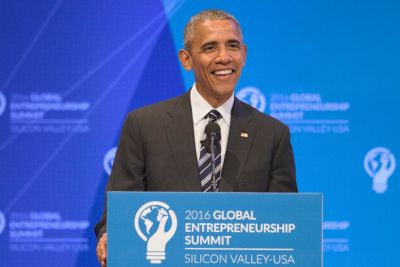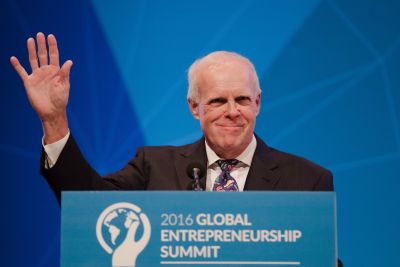President Barack Obama told an international audience at the seventh Global Entrepreneurship Summit that entrepreneurship is a bridge that connects the world for a more prosperous future.
“Part of this summit’s job is to make sure we are putting more tools, more resources into the hands of these folks who are changing the world,” he said today at Stanford.

Image credit: L.A. Cicero

Image credit: Aaron Kehoe

Image credit: Aaron Kehoe

Image credit: L.A. Cicero

Image credit: L.A. Cicero

Image credit: L.A. Cicero

Image credit: Aaron Kehoe

Image credit: L.A. Cicero

Image credit: L.A. Cicero

Image credit: L.A. Cicero

Image credit: L.A. Cicero
For three days on campus, GES 2016 brought together more than 700 entrepreneurs and 300 investors from 170 countries and territories. It was an opportunity for innovators around the world to build the kind of networks that will allow them to succeed.
In his introduction to Obama, Stanford President John Hennessy said Obama was the president who made nerd cool, crediting him with supporting research and technology.
“President Obama has a deep understanding of the importance of innovation and entrepreneurship, two characteristics that distinguish this university since its founding 125 years ago,” Hennessy said.
Go to the web site to view the video.
In his opening remarks Obama referenced the recent decision by Britain to leave the European Union. He emphasized that though Britain’s relationship with the EU will change, extremely stable relationships will continue to exist between the Western nations.
“Our shared values, including our commitment to democracy and pluralism and opportunity for all people in a globalized world, that will continue to unite all of us,” Obama said.
He said the globalized world has made people more interconnected, and that the audience represents the best of that interconnectivity.
“It is also important to find ways of expanding and broadening those benefits to more people,” Obama said.
The president, on his second trip to Stanford in two years, touted the role that the summit plays in helping to spread those benefits worldwide. The key is to connect and support entrepreneurs, and help them bring ideas, jobs and social programs to their respective countries, he noted.
Leading up to the summit, President Hennessy shared dinner with Obama, along with Silicon Valley venture capitalists and entrepreneurs, to discuss how to make communities around the world more economically prosperous, inclusive and secure.
Creating the future
A recurring theme was the need for global leaders to work in their countries to improve the environment for entrepreneurship. Many countries have poor resources and policies to help entrepreneurs.
Introducing the plenary session, Penny Pritzker, the U.S. Secretary of Commerce, called on attendees to push for laws in their countries that make it easier to start businesses. She also encouraged entrepreneurs who become successful to help those who follow.
“Leave the ladder down for those who wish to follow in your path,” she said.
Steve Case, the co-founder of AOL, reminded the audience that just 75 years ago Silicon Valley – now an international hub of innovation – was mostly fruit trees.
“That proves it can happen in your country as well,” Case said.
A bridge between cultures
President Obama called for the first Global Entrepreneurship Summit during a 2009 speech in Cairo, where he said encouraging entrepreneurship would deepen ties between the United States and Muslim-majority countries and create an alternative to extremism.
After the first GES in Washington, D.C., annual summits have been hosted in Turkey, the United Arab Emirates, Malaysia, Morocco and, last year, Kenya.
Bringing the event to the heart of Silicon Valley introduced attendees to a thriving environment for innovation, Obama said.
“It’s where two people in a garage launched a global company,” he said, referring to Hewlett-Packard, which was started by two Stanford graduates.
In his comments, Google CEO Sundar Pichai, MS ’95, said that the spirit of Silicon Valley is becoming a global one. He told the audience that when he came to Stanford, he entered a world where his ideas mattered more than where he came from, and said that attitude is spreading.
“We don’t know what is next or where it will come from but we know the barriers to entrepreneurship are tumbling,” he said.
Pichai added, “People working anywhere in the world born anywhere in the world can create a product and make it available to anyone in the world.”
Despite this new openness, a panel of young entrepreneurs mentioned difficulties connecting with people in their own countries or the world. In a conversation with Mark Zuckerberg, founder and CEO of Facebook, these innovators said that while they make use of Facebook tools, they are not always available in places without stable internet connectivity or in countries that block access.
Obama said, “It is hard to foster and encourage an entrepreneurial culture if it is closed and if information flows are blocked.”
He added that some countries want the benefits of entrepreneurship yet try to close off their societies. However, without openness and technology like the internet, innovation will not flourish.
GES legacy
Obama said that GES has now brought together more than 17,000 entrepreneurs, business leaders and foundations. At each summit, the White House has announced programs and initiatives in partnership with the host country, including commitments of venture capital and policies to support new businesses.
Leading up to GES 2016, the White House announced an expansion of its Startup in a Day program, run by the U.S. Small Business Administration, that reduces to a day the time it takes to register a new business and apply for permits and licenses on the local level.
The White House also announced an expansion of the National Science Foundation’s Innovation Corps entrepreneurship-training program, and a new “tech inclusion pledge,” which has been signed by more than 30 companies. The pledge commits companies to taking concrete steps toward making their workforce reflect the gender and racial diversity of the country.
Obama said the pledge, along with startups featured at GES focusing on women and youth, will empower people who have traditionally been locked out.
“We have to make sure they have the tools they need to start new ventures to help lift up entire populations,” Obama said.
History of entrepreneurship
Obama said Stanford is a place that celebrates the ability to discover and learn and create new ways to connect. He mentioned that Yahoo and Google started as student projects at Stanford.
“Those were really good student projects,” he said. “My student projects weren’t that good.”
Stanford alumni have founded more than 30,000 nonprofit organizations. One 2012 study estimated that companies formed by Stanford entrepreneurs generate world revenues of $2.7 trillion annually, and have created 5.4 million jobs since the 1930s. Companies with Stanford origins include Google, Yahoo, Cisco Systems, Intuit, Silicon Graphics and Sun Microsystems.
Obama said that the seven GES events have been so successful that he will commit the U.S. to be involved into the future. The power of such a summit, the president said, goes well beyond the event itself and even one presidency.
Next year’s summit will be held in India, Obama said. And if invited, he grinned, he promised to stop by. At the end of the event, Obama, who is known to enjoy talking about science and technology, left with a wave and shook hands with the young entrepreneurs.
“This has been so much fun,” he said.